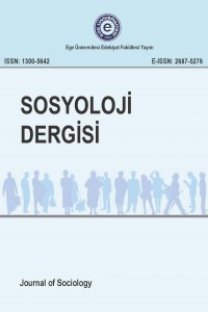KÜLTÜREL SERMAYE, EĞİTİM VE TOPLUMSAL TABAKALAŞMA: PIERRE BOURDIEU’NÜN YENİDEN ÜRETİM KURAMINA ELEŞTİREL BİR BAKIŞ
Bourdieu, Toplumsal sınıf, Eğitim, Eşitsizlik, Yeniden üretim, Kültürel sermaye
Cultural Capital, Education and Social Stratification: A Critical View on Pierre Bourdieu’s Reproduction Theory
Bourdieu, Social class, Education, Inequality, Reproduction, Cultural capital,
___
- • AKŞİT, B., ŞEN, M., COŞKUN, M. K., 2000, “Modernleşme ve Eğitim:
- Ankara’daki Orta Öğretim Okullarındaki Öğrenci Profilleri”, Mübeccel Kıray için Yazılar, (içinde) ATACAN, F., TÜRKAY, M. ve KURTULUŞ, F.E., (der.) İstanbul, Bağlam Yayınları • AKTAY, Yasin, 2007, “Pierre Bourdieu ve Bir Maxwell Cini Olarak Okul”,
- Ocak ve Zanaat, (içinde) ÇEĞİN, G., GÖKER, E., ARLI, A., TATLICAN, Ü., (der.) İstanbul: İletişim Yayınları • APPLE, Michael W., 1979, Ideology and Curriculum, Londra: Routledge and Kegan Paul
- • BALLARINO, G., BERNARDI, F., REQUENA, M. ve SCHADEE, H., 2009,
- “Persistent Inequalities? Expansion of Education and Class Inequality in Italy and Spain”, European Sociological Review, Vol.25, Sayı:1, s.123-138
- • BERGER, Eugenia H., 1983, Beyond the Classroom: Parents as Partners in
- Education, C. V. Mosby, St. Louis • BERNSTEIN, Basil, 1961, “Social Class and Linguistic Development: A
- Theory of Social Learning.” Education, Economy and Society, (içinde) HALSEY, A.H., FLOUD, J., ANDERSON, C.A., (der.), New York: Free Press. • BERNSTEIN, Basil, 1965, A Socio-Linguistic Approach to Social Learning.”
- Penguin Survey of Social Sciences, (içinde) GOULD, J., (der.), Harmondsworth: Penguin • BERNSTEIN, Basil, 1975, Class Codes and Control, Londra: Routledge and Kegan Paul.
- • BLAU, Peter M., DUNCAN, Otis Dudley, 1967, The American Occupational
- Structure, New York: Wiley • BOURDIEU, Pierre, 1974, “The School as Conservative Force: Scholastic and Cultural Inequalities”, Contemporary Research in the Sociology of
- Education, (içinde) J. EGGLESTON, J., (der.), Londra: Methuen • BOURDIEU, Pierre, 1977, “Cultural Reproduction and Social Reproduction”.
- Power and Ideology in Education,(içinde), KARABEL, J., HALSEY, A. H.,(der) New York: Oxford University Press • BOURDIEU, Pierre, 1988, Language and Symbolic Power, Cambridge: Polity Press
- • BOURDIEU, Pierre, 1990, The Logic of Practice, Stanford: Stanford University Press
- • BOURDIEU, Pierre, 2004, Distinction, A Social Critique of Judgements of
- Taste, Londra: Routledge and Kegan • BOURDIEU, Pierre, PASSERON, Jean C., 1996, “Reproduction in
- Education”, Society and Culture, Londra: Sage • BOWLES, Samuel, GINTIS, Herbert, 1976, Schooling in Capitalist America,
- Routledge and Kegan Paul, London • CELKAN, Hüseyin Y., 1991, Eğitim Sosyolojisi, Erzurum: Atatürk
- Üniversitesi K.K. Eğitim Fakültesi Matbaası • DEUTSCH, Martin, 1967, The Disadvantaged Child and the Learning
- Process, New York: Basic Books • DOUGLAS, James V.B., 1964, The Home and the School, A Study of Ability and Attainment in the Primary School, Londra: MacGibbon & Kee
- • GIDDENS, Anthony, 2000, Sosyoloji, Ankara: Ayraç Yayıncılık
- • GOLDTHORPE, John H., 2007, “Cultural Capital: Some Critical
- Observations”, Sociologica, 2, 1-23. • GOLDTHORPE, John H., LEWELLYN, C., PAYNE. C.,1980, Social Mobility and Social Class In Modern Britain, Oxford: Clarendon Press
- • GÜNEŞ-AYATA, Ayşe, ACAR, Feride, 2005, “Disiplin, Başarı ve İstikrar:
- Türk Orta Öğretiminde Toplumsal Cinsiyet ve Sınıfın Yeniden Üretimi”, Kültür Fragmanları, (içinde) KANDİYOTİ, D. ve SAKTANBER, A.,(der.) İstanbul: Metis Yayınları • HARKER, Richard, 1990, “Bourdieu: Education and Reproduction”, An
- Introduction to the Work of Pierre Bourdieu, (içinde) HARKER, R., MAHAR, C., WILKES, C.,(der.) Londra: Macmillan • ILLICH, Ivan D.,1973, Deschooling Society, Penguin, Harmondsworth
- • JACKSON, Brian, MARSDEN, Dennis, 1963, Education and Working Class, Londra: Routledge
- • JENKINS, Richard, 2002, Pierre Bourdieu, Londra: Routledge
- • KASNAKOĞLU, Zehra, 1975, Distribution In Turkey: A Study of
- Determinants of Male Earnings Differentials, Yayınlanmamış Doktora Tezi, Madison: University of Wisconsin • LABOW, William, 1972, Sociolinguistic Pattern, Philadelphia: University of Pennsylvania Press
- • LAREAU, Annette, 1987, “Social-Class Differences in Family-School
- Relationships: The Importance of Cultural Capital”, Sociology of Education, 60, 85 • LAREAU, Annette, Weininger, E. B., 2003, “Cultural Capital in Educational
- Research”, Theory and Society, 32: 567-606
- • LIGHTFOOT, Sara L., 1978, Worlds Apart, New York: Basic Books
- • MAHAR, Cheleen, HARKER, Richard, WILKES, Chris, 1990, The Basic
- Theoretical Position: An Introduction to the Work of Pierre Bourdieu, Londra: Macmillan • MARJORIBANKS, Kevin 1979, Families and Their Learning Environments:
- An Empirical Analysis, London: Routledge ve Kegan Paul • OGBU, John U., 1974, The Next Generation, New York: Academic Press
- • ÖZCAN, Yusuf Z., 1983, “The Educational Status Attainment Process –
- Male Urban Population”, Journal of Human Sciences, 11/1, 59-78
- • ROBINSON, Robert V. GARNIER, Maurice A., 1986, “Class Reproduction
- Among Men And Women In France: Reproduction Theory On Its Home Ground”, American Journal of Sociology, 91/2, 250-280. • RUPP, Jan C.C., LANGE, Rob De, 1989, “Social Order, Cultural Capital and Citizenship”. The Sociological Review, 37, 668-705
- • TEZCAN, Mahmut, 1996, Eğitim Sosyolojisi, Ankara: Feryal Matbaası
- • TRELEASE, Jim, 1982, The Road-Aloud Handbook, New York: Penguin
- • TURNER, Bryan, 1997, Eşitlik, (Çev. B.S. Şener), Ankara: Dost Kitabevi
- • TÜRK, Bahadır, 2007), “Sihirden Nefret Eden Bir İlüzyonist. Bourdieu,
- Gelenek ve İdeoloji”, Ocak ve Zanaat, (içinde) ÇEĞİN, G., GÖKER, E., ARLI, A. ve TATLICAN, Ü.(der.), İstanbul: İletişim Yayınları • VALENTINE, Charles A., 1968, Culture and Poverty, Chicago: University of Chicago Press
- • VARLIER, Oktay, 1981, Türkiye’de Kişisel Gelir Dağılımını Etkileyen
- Etmenler, 1973, Yayınlanmamış Doktora Tezi, Ankara
- • WILLIS, Paul, 1977, Learning How to Labour: How Working Class Get
- Working Class Jobs, Londra: Saxon House • YANIKLAR, Cengiz, 2006, Tüketimin Sosyolojisi, İstanbul: Birey Yayınevi
- ISSN: 1300-5642
- Yayın Aralığı: 2
- Başlangıç: 1987
- Yayıncı: Ege Üniversitesi, Edebiyat Fakültesi
POZİTİVİST SİYASET İDEOLOJİSİNİN 'İKTİDAR AHLAKI’ ÜZERİNE BİR NOT
TARIM POLİTİKALARI VE TARIMSAL FAALİYETLERİN DEĞİŞİMİ: MUĞLA KÖYLERİ ÖRNEĞİ
Toplumsal Topografya ve Sınıf Analizi: Pierre Bourdieu’nun İlişkisel Sosyolojisi
NURETTİN TOPÇU'NUN TÜRKİYE CUMHURİYETİ'NİN MODERNLEŞME PROJESİ KRİTİĞİ
TARIM POLİTİKALARI VE TARIMSAL FAALİYETLERİN DEĞİŞİMİ: MUĞLA KÖYLERİ ÖRNEĞİ
POZİTİVİST SİYASET İDEOLOJİSİNİN 'İKTİDAR AHLAKI’ ÜZERİNE BİR NOT
NURETTİN TOPÇU'NUN TÜRKİYE CUMHURİYETİ'NİN MODERNLEŞME PROJESİ KRİTİĞİ
Boş Zaman Toplumunun İmkanlılığı: Türkiye’de Varlıklı Yaşlılarda Boş Zamanın Metalaşması
